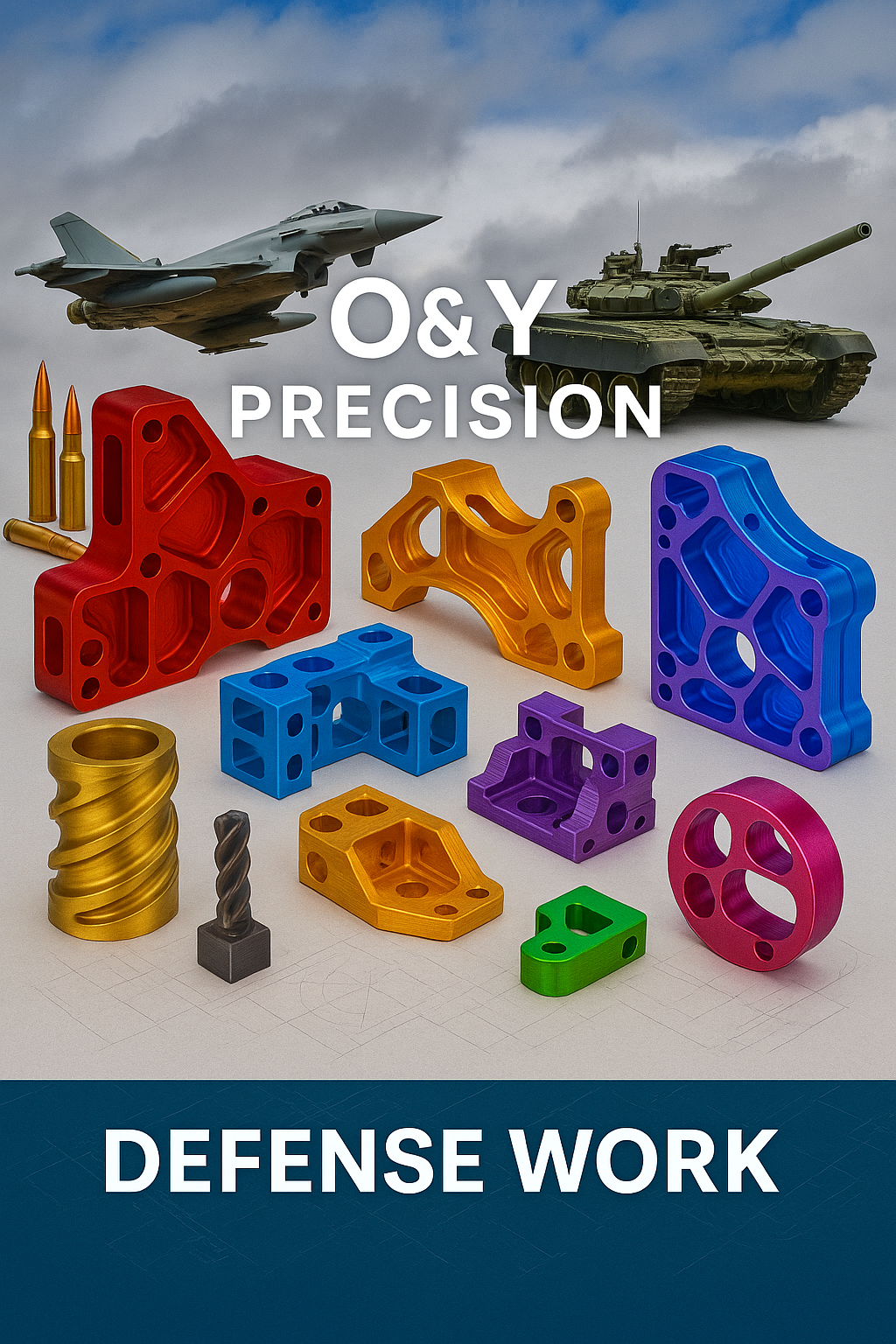Doing Defense Work as a Precision Machine Shop
Working within the defense sector presents unique opportunities for a precision machine shop, but it also introduces some of the most demanding challenges in the manufacturing industry. Defense work requires more than just machining capability—it demands absolute commitment to quality, compliance, and security. Below, we’ll outline the major aspects of what’s involved in supporting defense projects, from the materials we work with to the strict requirements we must follow.
The Challenges of Defense Machining
Unlike commercial machining, defense work often involves:
-
Tight tolerances: Parts must perform under extreme conditions and are frequently held to tolerances measured in ten-thousandths of an inch.
-
Complex geometries: Components often include intricate features, dovetails, deep bores, and complex surfaces requiring 5-axis machining.
-
Long lead times and critical deadlines: Defense contracts typically involve multi-tier schedules where a delay on one part can impact a larger program.
-
Documentation and traceability: Every step must be logged, from raw material purchase through final inspection, to ensure compliance and accountability.
Materials Commonly Used in Defense Projects
Defense applications call for materials engineered to survive high stress, heat, and corrosion. Common materials include:
-
Super alloys: Inconel, Hastelloy, and Monel for high-temperature strength.
-
Stainless steels: 15-5, 17-4, and 440C for durability and corrosion resistance.
-
Titanium alloys: Lightweight with excellent strength-to-weight ratio.
-
Aluminum alloys: 7075, 6061, and specialty grades for aerospace and defense applications.
-
Exotic materials: Copper-nickel alloys, tool steels, and composite inserts.
Each material comes with its own machining challenges—from tool wear in Inconel to distortion in thin-walled aluminum parts. A shop must not only have the right machines, but also the expertise to optimize feeds, speeds, and tooling strategies.
The Quoting Process
Defense quoting goes far beyond providing a price. A thorough quote requires:
-
DFM (Design for Manufacturability) review: Identifying potential risks, tolerances, and features that may drive cost.
-
Material sourcing: Confirming availability of certified domestic or DFARS-compliant material.
-
Sub-tier processing: Coordinating NADCAP-approved vendors for plating, anodizing, welding, or coatings.
-
Capacity planning: Ensuring machines, personnel, and inspection equipment are available to meet deadlines.
-
Risk assessment: Evaluating schedule risks, supply chain vulnerabilities, and required certifications.
Defense customers expect accurate quoting up front; underestimating complexity can quickly erode margins or create schedule slips.
Compliance Requirements
Defense machining isn’t just about building parts—it’s about meeting a full spectrum of compliance obligations:
-
ITAR (International Traffic in Arms Regulations): Requires strict control of technical data and physical parts, ensuring that sensitive information never leaves U.S. borders. Shops must have secure servers, restricted access, and compliance training in place.
-
ISO 9001 & AS9100: Quality management systems that formalize every aspect of the operation, from document control to corrective action reporting. AS9100 is especially critical in aerospace and defense.
-
Cybersecurity (NIST 800-171 / CMMC): Shops must safeguard digital data against cyber threats, a growing concern in defense supply chains.
-
NADCAP approvals (via sub-tiers): For processes like heat treating, coatings, and welding, shops must ensure only accredited vendors are used.
Building Trust with Defense Customers
Success in the defense sector comes down to more than machines and materials—it’s about reliability and reputation. Customers expect:
-
Flawless documentation: FAI (First Article Inspection), CMM reports, and traceability packages.
-
On-time delivery: Meeting deadlines that often tie directly to mission-critical schedules.
-
Clear communication: Proactive updates on risks, progress, and resolution of issues.
-
Continuous improvement: Demonstrating investment in new technology, automation, and training to stay ahead of requirements.
Final Thoughts
Defense machining is not for every shop—it requires heavy investment in equipment, quality systems, and compliance infrastructure. But for those prepared to meet the challenge, it offers the chance to contribute to critical programs that directly support national security.
Precision, accountability, and trust are the pillars of doing defense work successfully. It’s not just about cutting metal—it’s about helping build the future of defense technology.










